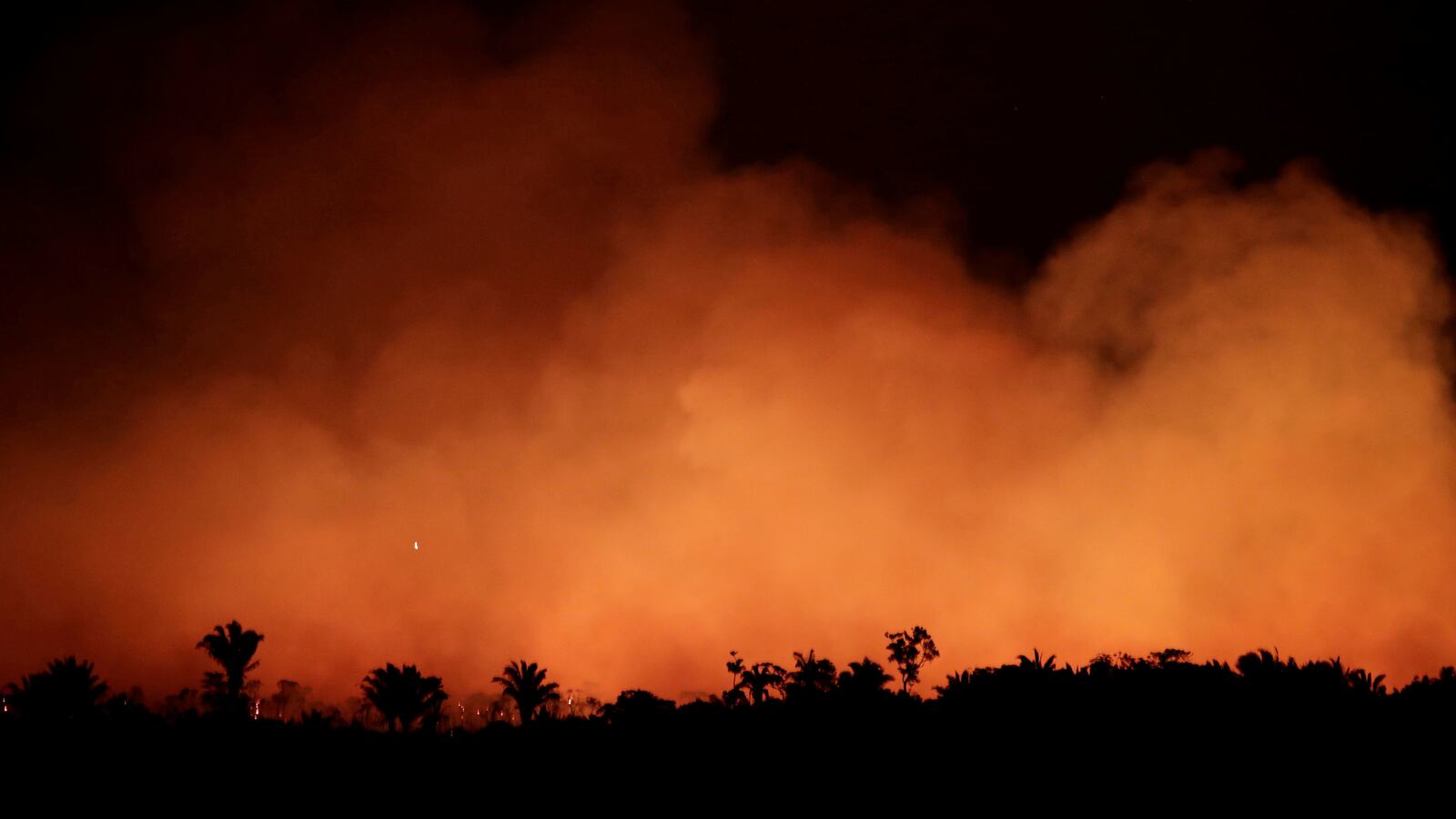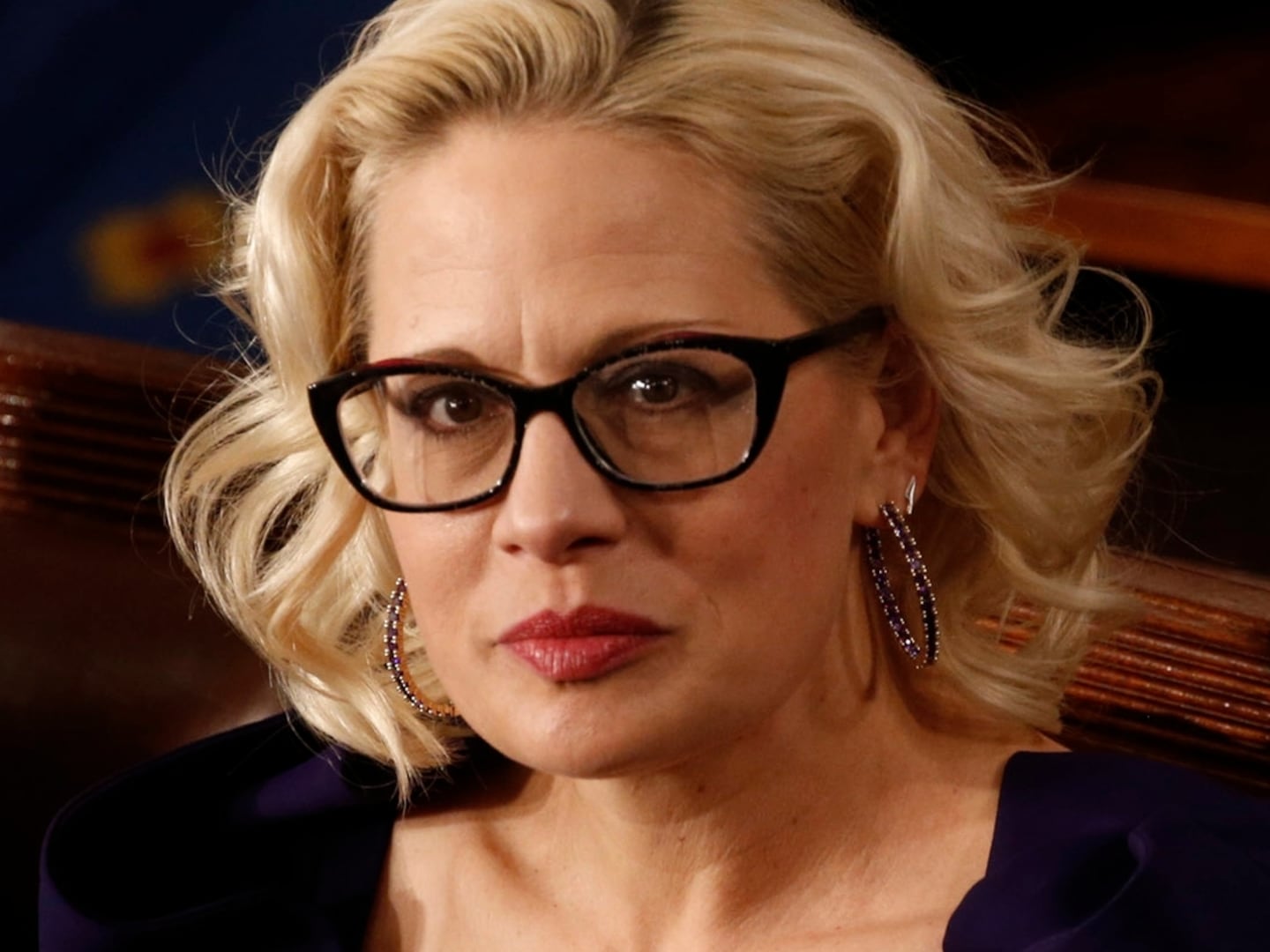Our collective response to the burning of the Amazon—the Earth’s most valuable carbon dioxide-sucking asset—has made clear it’s time for a new geopolitical handbook to address the climate emergency.
When Iran threatened to develop nuclear weapons, the U.S. applied crippling sanctions that forced the Iranians to the negotiating table. When Iraq ignored Kuwait’s sovereignty and the Russians seized land from the Ukrainians, we responded militarily and economically. Even the Trump administration applied an arsenal of soft power when Venezuelan elections called into question the legitimate leadership of the country.
But as the world approaches a 2035 “point of no return” for the climate reaching a dangerous and irreversible temperature rise, when one of our last great hopes to reverse the effects of climate change went up in flames this month, global state leaders have done nothing as Bolsonaro, echoing the historic rhetoric of the Russians and the Chinese, has said this is a domestic decision for Brazilians.
Much has been said about the rise in conflicts we will see due to climate change as diverse ecosystems are threatened, low-lying countries are flooded and mass migration increases. With the right leadership, world leaders ratified the Paris Treaty that would have helped prevent catastrophe. But today too few punitive measures are available or exercised to hold accountable bad actors that put our survival at risk. Democratic leaders should commit to holding those individuals accountable globally and creating a deterrent structure with the same focus and impact as our efforts to prevent the spread of nuclear weapons.
The Amazon rainforest absorbs a quarter of the carbon dioxide taken in by trees worldwide—one of our only natural tools to reverse the impacts of climate change. President Bolsonaro has promoted mining and agricultural development in the region which has led to an increase in wildfires and the longtime potential to end the Amazon’s ability to soak up C02 if it becomes significantly partitioned and biodiversity is harmed.
Our climate knows no national borders. Bolsonaro has put an essential asset that is protecting all of us at risk for short-term economic gain. Swift action that would force a reversal is needed, and the response won’t just be generated because of PR pressure. World leaders should ban together and use all of their diplomatic leverage—including considering sanctions—to force Bolsonaro to back down.
Senator Brian Schatz of Hawaii, whose islands have recently experienced crippling flooding due to the most intense rainstorms ever recorded in the U.S., deserves credit for committing on Thursday to work to pull U.S. funding and investment from Brazil until action is taken to protect the Amazon. French President Emmanuel Macron called for taking action at the upcoming G7 meeting.
That shows the kind of bold and immediate action that is needed when bad actors put our climate at risk. The U.N. Conference of Parties provides an important forum to collaborate over long-term action and treaties when most countries are in agreement, but doesn’t offer a structure for fast-moving, punitive action to be taken outside of enforcing long haggled over treaties. We should work with our closest and most powerful allies to drive quick outcomes that protect our collective future. That might mean tapping the G7 and NATO in new ways, or it might mean building a coalition of climate hawks willing to take aggressive action as crises arise even if some less helpful world powers don’t sign off.
Bolsonaro’s actions are a harbinger of what’s to come. Indonesia, now the third largest emitter of greenhouse gases behind the U.S. and China, has the largest rainforest in Asia but developers are eliminating more than 2 million acres of it every year. The Russians control 80 percent of the oil and gas in the Arctic and could start wantonly developing there. Petrostates in South America, Africa, and the Middle East have been slow to change their behavior even if their leadership has changed their rhetoric about the climate crisis. As much of the developed world transitions from coal, the Australians are keeping developing economies in Asia hooked on coal.
Democratic presidential candidates have proposed bolder domestic climate actions and elevated the issue in this year’s presidential campaign. Speaker Pelosi launched a Select Committee on the Climate Crisis. And in an effort led by Michael Bloomberg and Jerry Brown—(disclosure: BPI does work for Bloomberg Philanthropies, but this column represents my own opinion)—cities, states and businesses are working to meet their commitments to the Paris Treaty even after Trump pulled out by reducing emissions, promoting efficiency, and transitioning to renewable energy sources. Our next president could expand this domestic commitment with bolder global action that not only recommits to a Paris-style framework, but includes real accountability and checks against rogue actors whose actions could quickly undermine our collective effort.
We need to catalogue the assets that protect us from the existential threat posed by climate change and protect them like our lives depend upon it. Democratic candidates have acknowledged that climate change poses a national security risk, and the next Democratic president needs to respond with a geopolitical plan to contain the threat as aggressively as we take domestic action.
Ben LaBolt is a communications strategist and partner at Bully Pulpit Interactive (BPI) who served on three presidential campaigns and as an adviser to Democrats such as President Barack Obama, Sen. Sherrod Brown, and Mayor Rahm Emanuel. He worked on energy and climate issues in the Obama White House.






